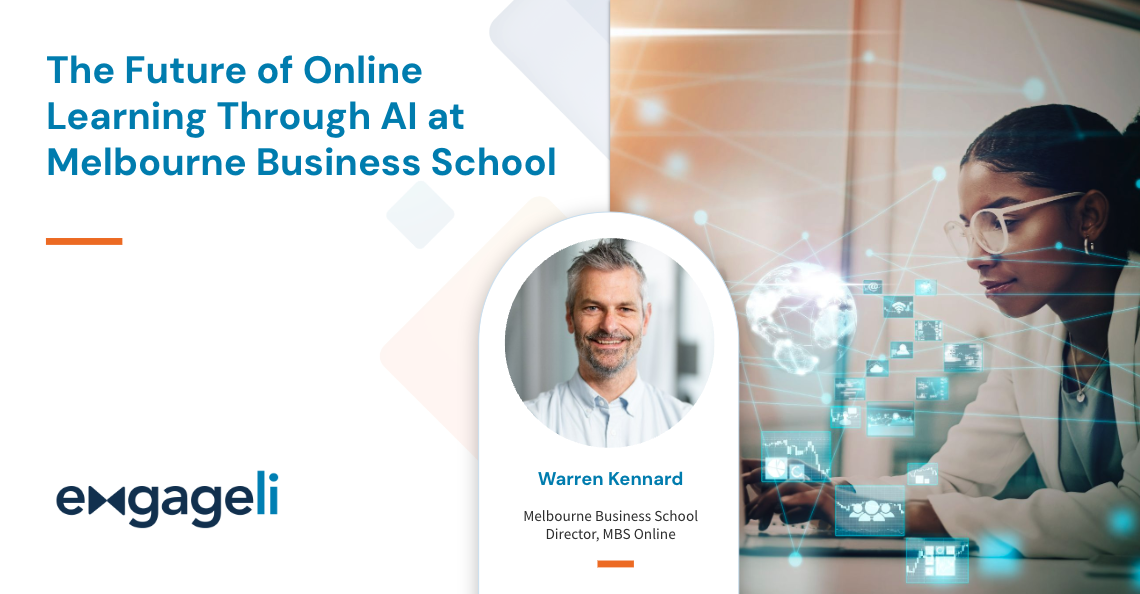In today’s digital landscape where new ideas continually reshape the field of higher education, Engageli seeks to spotlight thought leaders who are making an impact. This article, featuring the work of Warren Kennard, explores the transformative potential of technology and AI in online education.
As online learning continues to evolve, the education sector is witnessing unprecedented opportunities for democratizing access to quality education. Melbourne Business School, like many institutions, is excited about the potential of technology and artificial intelligence (AI) to transform the educational landscape. In this post, we'll explore the biggest opportunities and challenges that lie ahead, with a focus on personalized learning, virtual teaching assistants, content creation, and innovative assessment methods.
Opportunities of Integrating Technology and AI in Online Learning
1. Democratizing Education through Technology: The integration of technology and AI in online learning presents a unique opportunity to provide quality education to individuals who lack the means or access to traditional higher education. Online learning platforms and tools such as Engageli and community-based platforms are facilitating access to education on a global scale. This opportunity to democratize education and reach underserved populations is one of the most promising aspects of online learning.
2. Personalized Learning with Virtual Teaching Assistants: Advancements in AI, including sophisticated bots and ChatGPT, offer exciting prospects for personalized learning. Virtual teaching assistants can provide one-on-one support, tailoring their guidance to individual students' needs. This level of personalized interaction enhances the learning experience and addresses the limitations of the current online facilitation model, which often caters to a larger group of students simultaneously.
3. Content Creation and Knowledge Verification: The future of online education may witness a transformative shift in content creation. As reliable, independently verified content becomes readily available, the creation of courses can be accelerated significantly. This enables educators to develop new courses quickly, catering to emerging skill requirements and industry demands. Independent validation of skills and knowledge will play a crucial role in assessing learners' competency. Biometrics, facial recognition, and other biomarkers may offer innovative ways to verify skills and validate knowledge.
4. Assessment Reinvented: Assessment methodologies are also poised for a revolution in the online learning landscape. Traditional exams and assignments may be complemented or even replaced by more immersive and interactive assessment methods. Imagine a scenario where biometric data, such as facial recognition and voice analysis, can provide insights into a student's confidence and competency. Additionally, advancements in virtual reality (VR) technology, such as Apple's VR headsets, may open new avenues for assessing practical skills across various domains, from carpentry to automotive repair.
Challenges and Future Considerations for Online Learning
While the opportunities are abundant, challenges accompany the integration of technology and AI in education. Ensuring equity and access to technology for all students remains a key challenge. Furthermore, addressing concerns around data privacy, ethical use of AI, and maintaining human connection in the online learning environment are ongoing considerations.
The evolving landscape of online learning presents vast opportunities for transforming education and reaching learners worldwide. Melbourne Business School Online is actively contemplating and experimenting with the feasibility and benefits of personalized learning, virtual teaching assistants, content creation, and innovative assessment methods to enhance the educational experience. As technology continues to advance, it is crucial to navigate the challenges ethically and thoughtfully, ensuring that online education remains inclusive, engaging, and effective. The future of education is being shaped, and with each innovation, the boundaries of learning are expanding further.

